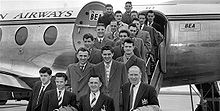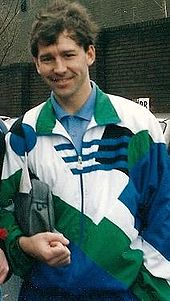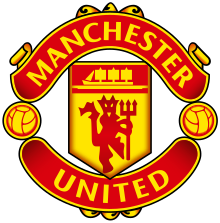Manchester United F.C.
From Wikipedia, the free encyclopedia
Manchester United Football Club is an English professional
football club, based in
Old Trafford, Greater Manchester, that plays in the
Premier League. Founded as
Newton Heath LYR Football Club in 1878, the club changed its name to Manchester United in 1902 and moved to
Old Trafford in 1910.
The 1958
Munich air disaster claimed the lives of eight players. In 1968, under the management of
Matt Busby, Manchester United was the first English football club to win the
European Cup. The current manager, Sir
Alex Ferguson, has won 37 major honours since he took over in November 1986.
[3][4]
Manchester United has won the most trophies in
English football, including a record 19
league titles, a record 11
FA Cups,
[5] four
League Cups and a record 19
FA Community Shields. The club has also won three
European Cups, one
UEFA Cup Winners' Cup, one
UEFA Super Cup, one
Intercontinental Cup and one
FIFA Club World Cup. In
1998–99, the club won a "
Treble" of the Premier League, the FA Cup and the UEFA Champions League, an unprecedented feat for an English club.
Manchester United is one of the wealthiest and most widely supported football teams in the world.
[6][7][8][9] As of July 2011, the club is number one in Forbes magazine's annual ranking of the world's 50 most valuable sports teams, valued at $1.86 billion.
[10] After being floated on the
London Stock Exchange in 1991, the club was purchased by
Malcolm Glazer in May 2005 in a deal valuing the club at almost £800 million.
[11]
History
Early years (1878–1945)
Manchester United was formed in 1878 as Newton Heath LYR Football Club by the Carriage and Wagon department of the
Lancashire and Yorkshire Railway depot at
Newton Heath.
[12] The team initially played games against other departments and rail companies, but on 20 November 1880, they competed in their first recorded match; wearing the colours of the railway company – green and gold – they were defeated 6–0 by
Bolton Wanderers' reserve team.
[13] By 1888, the club had become a founding member of
The Combination, a regional football league. Following the league's dissolution after only one season, Newton Heath joined the newly formed
Football Alliance, which ran for three seasons before being merged with the Football League. This resulted in the club starting the 1892–93 season in the
First Division, by which time it had become independent of the rail company and dropped the "LYR" from its name.
[12] After two seasons, the club was relegated to the
Second Division.
[12]

The Manchester United team at the start of the
1905–06 season, in which they were runners-up in the Second Division
In January 1902, with debts of £2,670 – equivalent to £210,000 as of 2012
[nb 1] – the club was served with a
winding-up order.
[14] Captain
Harry Stafford found four local businessmen, including
John Henry Davies (who became club president), each willing to invest £500 in return for a direct interest in running the club and who subsequently changed the name;
[15] on 24 April 1902, Manchester United was officially born.
[16][nb 2] Under
Ernest Mangnall, who assumed managerial duties in 1903, the team finished as Second Division runners-up in 1906 and secured promotion to the First Division, which they won in 1908 – the club's first league title. The following season began with victory in the first ever
Charity Shield[17] and ended with the club's first FA Cup title. Manchester United won the First Division for the second time in 1911, but at the end of the following season, Mangnall left the club to join
Manchester City.
[18]
In 1922, three years after the resumption of football following the First World War, the club was relegated to the Second Division, where it remained until regaining promotion in 1925. Relegated again in 1931, Manchester United became a
yo-yo club, achieving its all-time lowest position of 20th place in the Second Division in 1934. Following the death of the club's principal benefactor,
J. H. Davies, in October 1927, the club's finances deteriorated to the extent that Manchester United would likely have gone bankrupt had it not been for
James W. Gibson, who, in December 1931, invested £2,000 and assumed control of the club.
[19] In the
1938–39 season, the last year of football before the Second World War, the club finished 14th in the First Division.
[19]
Busby years (1945–1969)

The Busby Babes in Denmark in 1955
In October 1945, the impending resumption of football led to the managerial appointment of Matt Busby, who demanded an unprecedented level of control over team selection, player transfers and training sessions.
[20] Busby led the team to second-place league finishes in 1947, 1948 and 1949, and to FA Cup victory in
1948. In 1952, the club won the First Division, its first league title for 41 years.
[21] With an average age of 22, the media labelled the back-to-back title winning side of 1956 "the Busby Babes", a testament to Busby's faith in his youth players.
[22] In 1957, Manchester United became the first English team to compete in the European Cup, despite objections from The Football League, who had denied
Chelsea the same opportunity the previous season.
[23] En route to the semi-final, which they lost to
Real Madrid, the team recorded a 10–0 victory over Belgian champions
Anderlecht, which remains the club's biggest victory on record.
[24]

A plaque at Old Trafford in memory of those who died in the Munich air disaster, including players names
The following season, on the way home from a European Cup quarter-final victory against
Red Star Belgrade, the aircraft carrying the Manchester United players, officials and journalists crashed while attempting to take off after refuelling in Munich, Germany. The
Munich air disaster of 6 February 1958 claimed 23 lives, including those of eight players –
Geoff Bent,
Roger Byrne,
Eddie Colman,
Duncan Edwards,
Mark Jones,
David Pegg,
Tommy Taylor and
Billy Whelan – and injured several more.
[25][26]
Reserve team manager
Jimmy Murphy took over as manager while Busby recovered from his injuries and the club's makeshift side reached the
FA Cup final, which they lost to
Bolton Wanderers. In recognition of the team's tragedy,
UEFA invited the club to compete in the
1958–59 European Cup alongside eventual League champions
Wolverhampton Wanderers. Despite approval from the FA, the Football League determined that the club should not enter the competition, since it had not qualified.
[27][28] Busby rebuilt the team through the 1960s by signing players such as
Denis Law and
Pat Crerand, who combined with the next generation of youth players – including
George Best – to win the FA Cup in
1963. The following season, they finished second in the league, then won the title in 1965 and 1967. In 1968, Manchester United became the first English (and second British) club to win the European Cup, beating
Benfica 4–1 in the
final[29] with a team that contained three
European Footballers of the Year:
Bobby Charlton, Denis Law and George Best.
[30] Matt Busby resigned as manager in 1969 and was replaced by the reserve team coach, former Manchester United player
Wilf McGuinness.
[31]
1969–1986

Bryan Robson was the captain of Manchester United for 12 years, longer than any other player.
[32] Following an eighth-place finish in the
1969–70 season and a poor start to the
1970–71 season, Busby was persuaded to temporarily resume managerial duties, and McGuinness returned to his position as reserve team coach. In June 1971,
Frank O'Farrell was appointed as manager, but lasted less than 18 months before being replaced by
Tommy Docherty in December 1972.
[33] Docherty saved Manchester United from relegation that season, only to see them relegated in 1974; by that time the trio of Best, Law, and Charlton had left the club.
[29] The team won promotion at the first attempt and reached the FA Cup final in
1976, but were beaten by
Southampton. They reached the final again in
1977, beating
Liverpool 2–1. Docherty was dismissed shortly afterwards, following the revelation of his affair with the club physiotherapist's wife.
[31][34]
Dave Sexton replaced Docherty as manager in the summer of 1977. Despite major signings, including
Joe Jordan,
Gordon McQueen,
Gary Bailey, and
Ray Wilkins, the team failed to achieve any significant results; they finished in the top two in 1979–80 and lost to
Arsenal in the
1979 FA Cup Final. Sexton was dismissed in 1981, even though the team won the last seven games under his direction.
[35] He was replaced by
Ron Atkinson, who immediately broke the British record transfer fee to sign
Bryan Robson from
West Bromwich Albion. Under Atkinson, Manchester United won the FA Cup twice in three years – in
1983 and
1985. In
1985–86, after 13 wins and two draws in its first 15 matches, the club was favourite to win the league, but finished in fourth place. The following season, with the club in danger of relegation by November, Atkinson was dismissed.
[36]
Ferguson years (1986–present)

Alex Ferguson has been manager of Manchester United since November 1986.
Alex Ferguson and his assistant
Archie Knox arrived from
Aberdeen on the day of Atkinson's dismissal,
[37] and guided the club to an 11th-place finish in the league.
[38] Despite a second-place finish in
1987–88, the club was back in 11th place the following season.
[39] Reportedly on the verge of being dismissed, victory over
Crystal Palace in the
1990 FA Cup Final replay (after a 3–3 draw) saved Ferguson's career.
[40][41] The following season, Manchester United claimed its first
Cup Winners' Cup title and competed in the
1991 UEFA Super Cup, beating
European Cup holders
Red Star Belgrade 1–0 in the final at Old Trafford. A second consecutive League Cup final appearance followed in 1992, in which the team beat Nottingham Forest 1–0 at Wembley.
[36] In 1993, the club won its first league title since 1967, and a year later, for the first time since 1957, it won a second consecutive title – alongside the FA Cup – to complete the first "
Double" in the club's history.
[36]

Ryan Giggs is the most decorated player in English football history.
[42] In the
1998–99 season, Manchester United became the first team to win the Premier League, FA Cup and UEFA Champions League – "The Treble" – in the same season.
[43] Losing 1–0 going into
injury time in the
1999 UEFA Champions League Final,
Teddy Sheringham and
Ole Gunnar Solskjær scored late goals to claim a dramatic victory over
Bayern Munich, in what is considered one of the greatest comebacks of all time.
[44] The club also won the Intercontinental Cup after beating
Palmeiras 1–0 in Tokyo.
[45] Ferguson was subsequently knighted for his services to football.
[46]
Manchester United won the league again in the
1999–2000 and
2000–01 seasons. The team finished as runners-up in
2001–02, before regaining the title in
2002–03. They won the
2003–04 FA Cup, beating
Millwall 3–0 in the final at the
Millennium Stadium in
Cardiff.
[47] In the
2005–06 season, Manchester United failed to qualify for the knockout phase of the UEFA Champions League for the first time in over a decade, but recovered to secure a second-place league finish and victory over
Wigan Athletic in the
2006 Football League Cup Final. The club regained the Premier League in the 2006–07 and 2007–08 seasons, and completed the
European double by beating Chelsea 6–5 on penalties in the
2008 UEFA Champions League Final in Moscow's
Luzhniki Stadium.
Ryan Giggs made a record 759th appearance for the club in this game, overtaking previous record holder Bobby Charlton.
[48] In December 2008, the club won the
2008 FIFA Club World Cup and followed this with the
2008–09 Football League Cup, and its third successive Premier League title.
[49][50] That summer, Cristiano Ronaldo was sold to Real Madrid for a world record £80 million.
[51] In 2010, Manchester United defeated Aston Villa 2–1 at Wembley to retain the
League Cup, its first successful defence of a knockout cup competition.
[52]
After finishing as runner-up to Chelsea in the 2009–10 season, United achieved a record 19th league title in 2010–11, securing the championship with a 1–1 away draw against Blackburn Rovers on 14 May 2011.
[53]
Players
First-team squad
- As of 8 January 2012.[126]
Note: Flags indicate national team as has been defined under FIFA eligibility rules. Players may hold more than one non-FIFA nationality.
On loan
Note: Flags indicate national team as has been defined under FIFA eligibility rules. Players may hold more than one non-FIFA nationality.
Reserves and academy
Former players
Club captains
Player records
Club officials
- Manchester United Limited
- Manchester United Football Club
- Coaching and medical staff
Managerial history
Honours
Manchester United's first trophy was the Manchester Cup, which it won as Newton Heath in 1886.
[147] In 1908, the club won its first league title, and won the
FA Cup for the first time the following year. Manchester United won the most trophies in the 1990s; five league titles, four FA Cups, one
League Cup, five
Charity Shields (one shared), one
UEFA Champions League, one
UEFA Cup Winners' Cup, one
UEFA Super Cup and one
Intercontinental Cup.
The club currently holds the record for most top-division titles (19), the most FA Cups (11), and the most
FA Cup Final appearances (18).
[148] Manchester United holds the record for the most Premier League titles (12), and was the first English team to win the
European Cup in 1968. The club's most recent trophy came in August 2011 with the
2011 FA Community Shield title.
The only major honour that Manchester United has never won is the
UEFA Europa League,
[149] although the team reached the quarter-finals in 1984–85 and the semi-finals of the competition's precursor tournament, the
Inter-Cities Fairs Cup, in 1964–65.
[150][151]
Domestic
League
- First Division[nb 3] (until 1992) and Premier League:[nb 3] 19
- 1907–08, 1910–11, 1951–52, 1955–56, 1956–57, 1964–65, 1966–67, 1992–93, 1993–94, 1995–96, 1996–97, 1998–99, 1999–2000, 2000–01, 2002–03, 2006–07, 2007–08, 2008–09, 2010–11
- Second Division:[nb 3] 2
Cups
- FA Cup: 11
- 1908–09, 1947–48, 1962–63, 1976–77, 1982–83, 1984–85, 1989–90, 1993–94, 1995–96, 1998–99, 2003–04
- League Cup: 4
- FA Charity/Community Shield: 19 (15 outright, 4 shared)
- 1908, 1911, 1952, 1956, 1957, 1965*, 1967*, 1977*, 1983, 1990*, 1993, 1994, 1996, 1997, 2003, 2007, 2008, 2010, 2011 (* shared)
European
Worldwide
Doubles and Trebles
Especially short competitions such as the
Charity/Community Shield,
Intercontinental Cup (now defunct),
FIFA Club World Cup or
UEFA Super Cup are not generally considered to contribute towards a Double or Treble.
[152]

 Comment
Comment 






